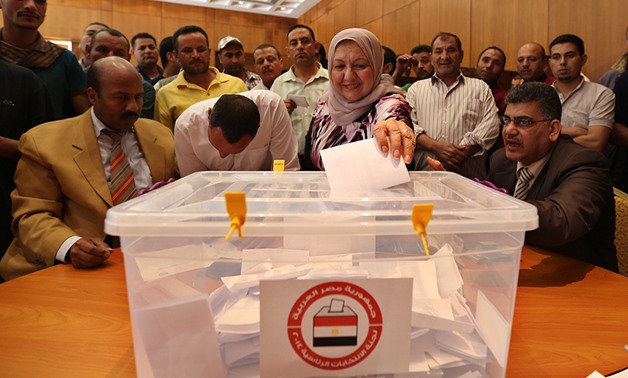
Egyptians living in Jordan cast their ballots for the presidential election at the Egyptian embassy in Amman. REUTERS
CAIRO – 4 January 2018: Every year brings change and perspective. With 2017’s close, another tumultuous year in the Middle East ends. From the rapid collapse of the Islamic State throughout Syria and Iraq, to the independence referendum in Iraqi Kurdistan; a wave of deadly terror attacks throughout Egypt, the unanticipated resignation and its subsequent reversal by Saad Hariri, and the brutal execution of Ali Abdullah Saleh in Yemen, 2017 has been another chaotic year for people in every reach of the region.
While the Middle East region is overwhelmed by conflict, political and economic instability, there are three important things to lookout for in 2018...
1. Regional conflict between Saudi Arabia and Iran
In Saudi Arabia, young Crown Prince Mohammed bin Salman has made leaps and bounds in consolidating power in the upper echelons of Saudi society, mostly under the guise of economic reform. The 32-year-old has de facto control of the Kingdom, and has embarked on an unprecedented campaign to reform Saudi society to meet the needs of a changing world. From women being allowed to drive, to instigating a highly public clampdown on corruption, change is coming at a fast pace.
The domestic challenges in Iran have been made clear. A week of protests has unravelled, the largest since 2009, resulting in 21 people killed and hundreds arrested. The widespread protests have forced the country into a public debate over the economic conditions and political discontent.
Both countries will have to effectively mediate domestic challenges as they focus on the regional stage. The catastrophic war in Yemen is pulling Saudi Arabia and Iran closer together geographically, and pushing both countries further apart politically. Saudi Arabia has blamed Iran for supplying the Houthi rebels with missiles which have been targeted at Riyadh in recent months. Iran is the principle backer of the Houthis, while MBS is engaged in a fierce military campaign in support of the Yemeni government.
.JPG) Saudi Arabia's Crown Prince Mohammed bin Salman is still following the old Stalinist magical propaganda. REUTERS
Saudi Arabia's Crown Prince Mohammed bin Salman is still following the old Stalinist magical propaganda. REUTERS
While both power-holders are finding themselves increasingly at odds in Yemen, no regional conflict has escaped their interference. For decades Saudi Arabia has held the top spot in the regional game of power politics, but the long arm of the Quds Force is finding increased success. Through proxy forces loyal to Tehran and Qom, Iran exerts significant influence over vast swathes of territory across Iraq, Syria and Lebanon.
2. Terrorism and ISIS
Notwithstanding the defeat of ISIS in Iraq and Syria, terrorism is and will remain a key challenge in the region. With ISIS pushed out of its strongholds in Syria and Iraq, many of its fighters are trudging back through the desert and returning home. For many of these fighters their grievances remain, and their return signals a major migration of trained fighters with a radical and intolerant ideology. The success of ISIS will not be forgotten any time soon, and while pockets of society harbour grievances, be it political, economic, social or religious, the environment for radicalisation remains.
The recent attack in northern Sinai comes as a stark reminder that terrorism, and most notability terrorism inspired by or associated with ISIS, is not gone, and will remain a major threat to regional and world stability. On November 24 of last year, ISIS-affiliated gunman stormed a mosque near the North Sinai capital of El-Arish, killing 235 people.
3. Elections
2018 is a significant year politically, with important elections taking place in Bahrain, Egypt, Iraq, Iraqi Kurdistan, Israel, Lebanon and Libya.
.jpg) A handout picture released by the Iraqi prime minister's press office on July 9, 2017, shows Iraqi Prime Minister Haider al-Abadi (C-R) shaking hands with army officers upon his arrival in Mosul. AFP
A handout picture released by the Iraqi prime minister's press office on July 9, 2017, shows Iraqi Prime Minister Haider al-Abadi (C-R) shaking hands with army officers upon his arrival in Mosul. AFP
“Too big to fail”; this was how many people labelled Egypt under Mubarak. How wrong they were. The protests which erupted across Egypt in 2011 against Mubarak, and 2013 against the Muslim Brotherhood, were arguably the world’s largest ever popular uprisings, and signalled a definitive demand for change. This change found support in Abdel Fatah al-Sisi, the now ex-military man who won the popular vote in 2014. Since then, Sisi has ruled Egypt with a strong grasp, taking bold steps to try and overcome the widespread economic and security problems in the country. 2018 will see the final test of Sisi’s four-year presidential term, with the public as the final judge, as many people have signed the ‘To Build It’ campaign petition, urging him to run for a second term.
The parliamentary elections in Iraq will serve as a testament for Haidar al-Abadi. Abadi came into power as the loss of Mosul and the collapse of the Iraqi army saw Nouri al-Maliki lose support, and more importantly faith in his ability to maintain security. The elections come at a tense time in Iraq. While the Iraqi army, the Hashd al-Shaabi militia groups, and the Kurdish Peshmerga have been successful in ousting ISIS from the country, there have been intense levels of in-fighting. The key concern lies in Iranian influence in Iraq, and the impact this will have on the forthcoming elections.
Twitter:

.jpg)
Comments
Leave a Comment